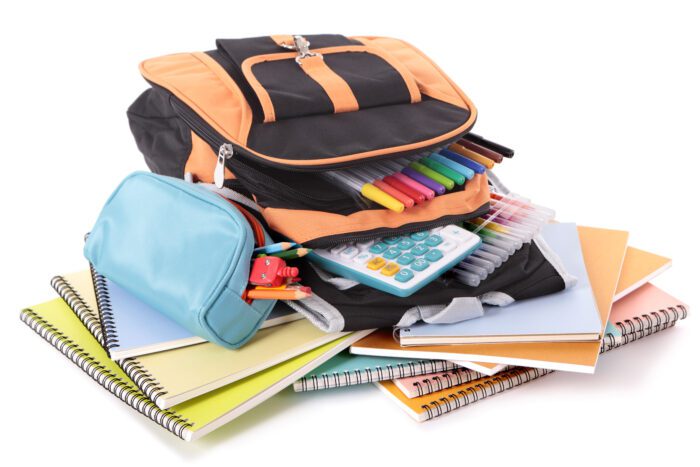
Every fall, schools fill with the sounds of new beginnings – new classes, new friends, shiny new lunchboxes, and, of course, new school supplies. But with all new things comes something less welcome: waste.
From snack wrappers to the coolest new backpack, the start of the school year often means a spike in litter, much of it tied to school supplies. While each piece may seem small, over time, it adds up to overflowing trash bins and a greater burden on our local environment.
Rethinking the Back-to-School List
Before the first bell rings, families can reduce waste by choosing sustainable school supplies that are reusable, durable, and low-waste. A few simple changes to supply shopping habits can reduce both waste and long-term costs:
Choose reusable over disposable.
At home, small changes in your daily routine can help reduce the amount of waste in your child’s backpack or lunchbox.
- Replace plastic sandwich bags with reusable silicone pouches or snack containers that can be used daily without tearing or leaking.
- Skip the prepackaged snacks and opt for bulk items, using reusable containers to minimize waste in your child’s lunchbox.
- Choose pencils and markers that can be refilled or reused.
Buy quality once.
Well-made backpacks, pencil cases, binders, and water bottles can last for multiple school years when properly cared for, saving money and reducing waste.
- Select durable materials, such as heavy-duty fabric, reinforced stitching, or stainless steel, to help withstand daily wear and tear.
- Add stickers and patches to make them fun and unique. They can be changed out every year!
Go for less packaging.
Choosing sustainable school supplies helps reduce waste and lower overall costs.
- Select items sold in bulk or without unnecessary plastic wrap, such as pencils or pens in a simple cardboard box instead of plastic sleeves, or glue sticks or crayons in bulk classroom packs with minimal packaging.
- Avoid heavily packaged novelty supplies that include excessive waste, like character-themed school sets with multiple layers of packaging (plastic window, box, internal wrap) or accessories you may not need.
- Coordinate with other families or your child’s teacher to purchase classroom essentials, like glue sticks or folders, in bulk packs, or host a school supply swap with neighbors or friends.
Reuse What You Already Have.
Before heading to the store, take a moment to take inventory. Many supplies from last year are still in great condition, allowing you to make the most of what you already own! And consider visiting places like Turnip Green Creative Reuse in Nashville, where families and teachers can find affordable, gently used school supplies while keeping useful materials out of landfills.
- Many teachers return unused materials at the end of the school year. Using these first helps save cost and waste!
- Items such as scissors, rulers, and folders often last multiple years with proper care.
Litter-Free Habits Start in the Classroom
Reducing litter isn’t just about the sustainable school supplies – it’s about the habits we build. In Tennessee schools, sustainability can be woven into daily routines:
- Teachers can help families make more sustainable choices by offering flexible supply lists and emphasizing long-lasting, reusable items.
- School administrators can create pre-packed supply kits using bulk purchases, which can reduce both packaging waste and overall cost for families.
- Turn waste reduction into a learning opportunity: Have students track what they throw away each week and brainstorm ways to reduce it.
- Simple classroom systems, like clearly labeled recycling bins or supply-share boxes, help reinforce sustainable thinking from a young age.
- Several Tennessee colleges model sustainable habits through programs like the Free Store at UT Knoxville and the ETSU Free Store, where students can access gently used supplies and dorm essentials for free.
Administrators and Educators Can Lead the Charge
Principals and school leaders play a key role in setting expectations. By promoting a culture of respect for school grounds and implementing small campus-wide policies, they can support a cleaner, greener learning environment.
Be the Change at School
- Add signs near entrances and gathering spots reminding students to properly dispose of litter in designated bins.
- Provide refill stations for water bottles to reduce the use of single-use plastics.
- Recognize classrooms or grade levels that maintain clean spaces and creatively reduce waste.
- Tennessee schools can also tap into resources like the Green Team Start-Up Guide provided by the state’s Office of Sustainable Practices to create campus-wide sustainability programs and reduce litter at the source.
Getting Families to Make Changes at Home
Families want their kids to do well, including learning to be responsible citizens. Schools can invite families into the sustainability effort by:
- Offering tips on school supply lists for sustainable shopping
- Sharing ideas for waste-free lunches and clever reuse at home
Sustainability can influence habits throughout the year when it becomes part of the conversation early on.
One Student, One Change, Big Impact
Reducing litter in schools isn’t about perfection. When students see that their choices matter, when parents and teachers model better habits, and when schools support the shift, small actions can create lasting change. By making thoughtful decisions this back-to-school season, Tennessee families and educators can help protect our shared spaces and teach the next generation that a cleaner future starts with the choices we make today.



